This post is more than a week late for its topic, but it is too interesting to not write some about.
Last week was October 10. In Taiwan, this is the National Day holiday 國慶日, commemorating the establishment of the Republic of China (ROC) which now governs Taiwan. For short, it’s often referred to as 雙十節 (“festival of the two tens” as a literal translation, but it seems like most people tend to say “Ten Ten Day” in English) because it occurs on October 10th. Interestingly, mainland China (PRC) celebrates the founding of its government on October 1st. I found that the coincidental closeness of these dates actually highlights the peculiar historical chasm between these two places. For example, I was talking with my father, who works in the PRC and he noted that the PRC National Day holiday was nearly concurrent with the mid-autumn festival this year, giving him an extended holiday of four days. During that time, he was considering flying back to Taiwan, where it would be mid-autumn festival, but not National Day. I also mentioned the October 1st holiday to a Taiwanese friend and she had no idea what I was talking about at first. However, the October 10th holiday is actually still celebrated in PRC, just not as the National Day. Confusing, eh?
I figured that I would use this as an opportunity to share some of my newly gained knowledge regarding this history for those of you who aren’t familiar with it. (But I’m also no historian, so this is pretty basic and you could go explore the Wikipedia articles for yourself if you are so inclined. And if you’re not interested in reading my account of this, you can skip down to the pictures below for my story and not my renditions of modern Chinese history.)
The October 10th holiday technically commemorates the start of the 1911 Wuchang revolution 武昌起義 that overthrew the Qing dynasty, ending thousands of years of dynasty rule in China. It’s actually not a coincidence that this occurs close to the mid-autumn festival, as the original date chosen for the rebellion to occur was the mid-autumn festival, it just didn’t work out. The ROC was officially established at the start of the following year, January 1, 1912, thus celebrates the 1911 revolution as its beginning. However, because the communist government of the PRC sees this rebellion as one of the necessary precursors for the later communist revolution, they also celebrate the 1911 rebellion, just more specifically as the Wuchang Uprising Day 武昌起義紀念日. The PRC further celebrates October 1st as their National Day after October 1st, 1949 – which is when Mao Zedong declared the official establishment of the PRC. This was after the Chinese Civil War and the Chinese Revolution during which the Communist Party of China (CPC) defeated the Chinese Nationalist Party (KMT). Upon their defeat, the KMT fled to Taiwan, officially relocating the ROC government to Taipei.
So of course the ROC government in Taiwan isn’t interested in celebrating October 1st (essentially its defeat in 1949), but both governments celebrate October 10th, and everyone celebrates mid-autumn festival. And there you have it: Taiwan and the Mainland historically and culturally from the same heritage, yet separated politically since 1949. (Political separations between Taiwan and mainland China have been around since before the the KMT relocated.)
As a Fulbrighter, I was extended a special invitation to a large party held by the Ministry of Foreign affairs. It was really fun and a pretty fancy affair with most of the Who’s Who of foreign dignitaries present, and included an appearance by the Taiwanese president, Ma Ying-jeou. To be honest, I didn’t do a particular thorough job of socializing with the other foreign dignitaries as I was distracted by some of the other things going on. Check it out:
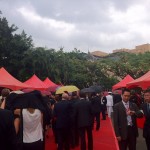
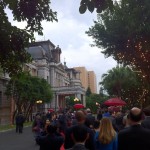
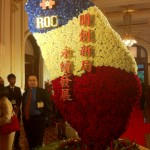
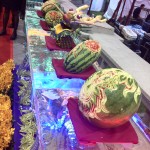
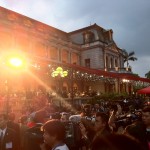
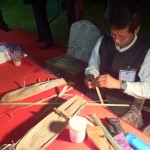
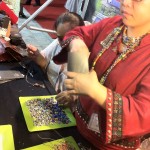

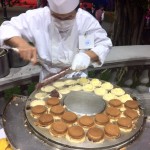
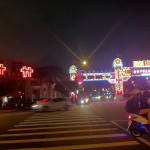
” I was too excited to take pictures of anything, but had slowed down by the time I reached this dessert table.”
LOLERSKATEZ
Also, this man: burning through the boba
http://www.hamroni.com/wp-content/uploads/2012/10/2012-10-10-18.39.35.jpg
It was a pretty epic spread of food of all types. Seriously. And boba is definitely considered a piece of Taiwanese cuisine now, so of course they had a table where you could get it. :)